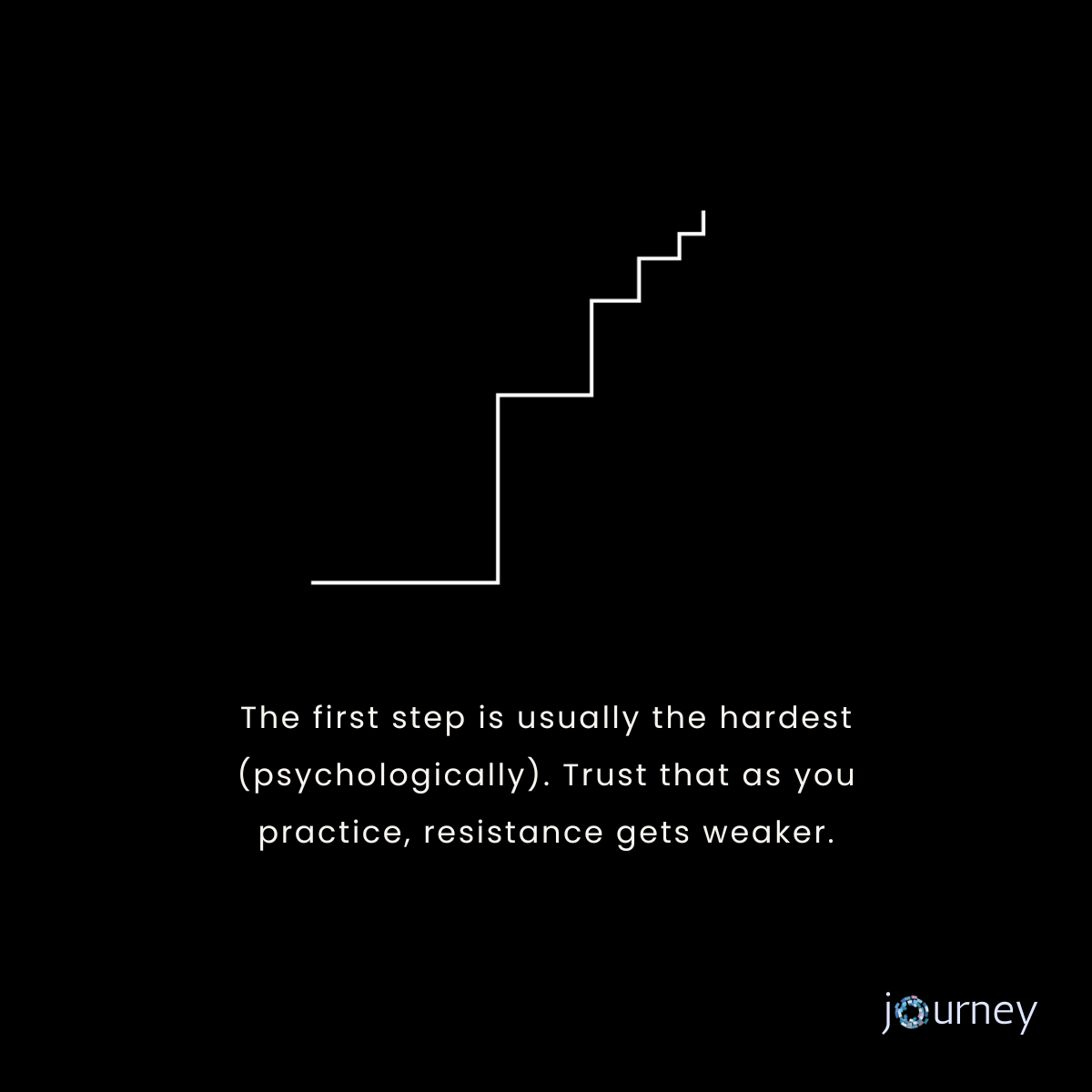Making a Change: One Small Step
Making a Change: One Small Step is about how small steps can be taken to make meaningful change in our lives. JOURNEY believes that change is hard, and in this time of information overload, it’s essential to look at the problem differently. We often believe that bigger is better, but in reality, small steps are more doable for our minds and bodies.
For example, when it comes to exercise for health, many people believe that only a certain type or level of exercise will get us where we need to be. However, it’s hard to go from no exercise to an hour at the gym every day. Instead, choose one small step, something that takes little time and effort, like parking further away from work, and doing that for 30 days until it becomes habitual. These small changes may seem insignificant, but they are additive and can create exponential change.
Radical change can actually cripple people into inaction. When we meet with success in the short term, we often find ourselves falling back into old habits. The alternative is to take another path altogether, one that winds gently up the hill, that is pleasant to negotiate and soft to tread. All it requires is that we place one foot in front of the other.
To make change possible, think of some small steps for starting to exercise and saving money, reminding us that any change requires eating the broccoli. The key is to pick one small step that is relatively easy and doable and to stick with it until it becomes habitual.
Here are some Small Steps you can take when asking for a raise:
1. Do your research: Before asking for a raise, research the average salary for someone in your position and industry. This will give you a better understanding of what is reasonable to ask for.
2. Keep track of your accomplishments: Keep a record of your achievements and contributions to the company. This will help you make a case for why you deserve a raise.
3. Schedule a meeting: Schedule a meeting with your boss to discuss your salary. Make sure to choose a time when they are not too busy or stressed.
4. Be confident and assertive: When asking for a raise, be confident and assertive. Clearly state your case for why you deserve a raise and provide evidence to support your argument.
5. Be open to negotiation: Be open to negotiation and willing to compromise. Your boss may not be able to give you the exact amount you are asking for, but they may be able to offer other benefits or perks.
6. Follow up: After the meeting, follow up with your boss to thank them for their time and to reiterate your interest in a raise. If they need time to consider your request, ask when you can expect to hear back from them.
Here are some additional small steps for starting to exercise:
- Start with a 5-minute workout routine, such as stretching, jumping jacks, or push-ups, and gradually increase the duration over time.
- Schedule exercise time in your daily routine, like an appointment that cannot be missed.
- Find an accountability partner, such as a friend or family member, to exercise with you or to check in on your progress.
- Join a beginner’s class or group fitness program to learn new exercises and meet like-minded individuals.
- Take a break from your work or study every hour to do some physical activity, such as walking around the office or doing squats at your desk.
- Listen to music or podcasts that inspire you to move and stay motivated.
- Reward yourself for reaching your exercise goals, such as treating yourself to a healthy meal or buying new workout gear.
- Use a fitness app or tracker to monitor your progress and set achievable goals.
Here are some small steps for using time more productively:
- Make a to-do list: Start your day by making a to-do list of tasks that need to be completed. This will help you prioritize and stay focused on what needs to be done.
- Take breaks: Taking short breaks throughout the day can help you recharge and stay productive. Take a 5-10 minute break every hour to stretch, walk around, or do something relaxing.
- Eliminate distractions: Identify and eliminate any distractions that may be hindering your productivity. This can include turning off your phone or notifications, closing unnecessary tabs on your computer, or finding a quiet place to work.
- Set deadlines: Set realistic deadlines for yourself to complete tasks. This will help you stay on track and avoid procrastination.
- Prioritize tasks: Prioritize tasks based on their importance and urgency. Focus on completing the most important and urgent tasks first before moving on to others.
- Delegate tasks: If possible, delegate tasks to others to free up time for more important tasks.
- Learn new skills: Use spare time to learn new skills or knowledge that will help you be more productive. This can include taking online courses, reading books or articles, or attending workshops or seminars.
- Plan for tomorrow: Take a few minutes at the end of each day to plan for the next day. This will help you start your day with a clear plan and purpose.



excellent content and very helpful. Like the way that I was able to click from my email starter to read more and land on this page
For the JOURNEY design team… It’s not clear to me who Richard is, what Kaisen is, and there are a few of the numbered steps missing the bold headings. outstanding content… Very helpful, important to know the source.
Estimated read time might be helpful… + an audio version of this available for those who would prefer not to read it.